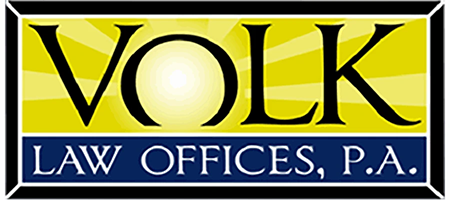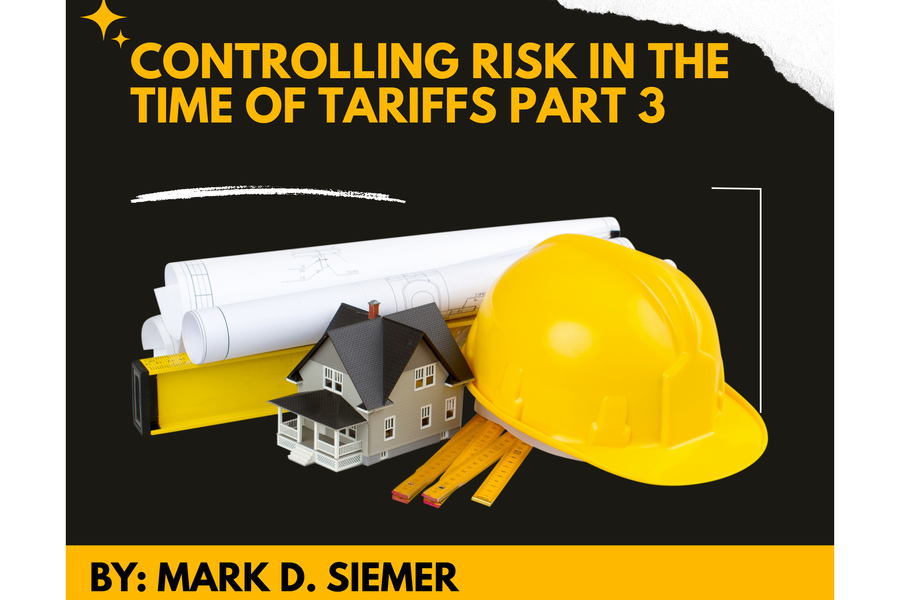Controlling Risk in the Time of Tariffs Part 3
Posted: May 27th, 2025
Written By: Mark Siemer
In the construction industry, price volatility due to tariffs can significantly impact project costs and timelines. A well-drafted price escalation clause in construction contracts can help mitigate these risks, providing a more predictable and enforceable agreement.
Understanding Price Escalation Clauses
A price escalation clause allows for adjustments to the contract price based on changes in the cost of materials. This is particularly useful in an environment where tariffs can cause sudden and significant price increases. By including such a clause, contractors and owners can negotiate and pre-plan who bares the risk of price fluctuations, ensuring that neither party gets surprised by unexpected cost increases.
Materials Prone to Price Escalation
Certain materials are especially susceptible to price increases due to tariffs. These include:
1. Steel and Aluminum: Tariffs on steel and aluminum imports can lead to substantial cost increases for these essential construction materials.
2. Lumber: Tariffs on lumber, particularly from Canada, can drive up prices, affecting framing and other wood-based components.
3. Cement and Concrete: Tariffs on cement imports can increase the cost of concrete, a fundamental material in many construction projects.
4. Finished and Manufactured Products: Items such as appliances, electrical components, and HVAC systems are also vulnerable to price hikes due to tariffs on imported goods.
Benefits of a Specific Price Escalation Clause
A specific price escalation clause with a defined trigger event can provide more certainty and enforceability in construction contracts. Here’s how:
1. Defined Trigger Events: By specifying the conditions under which the price escalation clause is activated, such as a tariff increase of a certain percentage, both parties have a clear understanding of when adjustments will be made.
2. Objective Metrics: Using objective indices, such as the Producer Price Index (PPI) for specific materials, ensures that price adjustments are based on reliable data.
3. Transparency and Fairness: A well-defined clause promotes transparency and fairness, as both parties agree upfront on how price changes will be handled.
4. Reduced Disputes: Clear terms reduce the likelihood of disputes, as the process for price adjustments is predetermined and agreed upon.
What To Do If You Have a Price Escalation Clause?
Many contracts come with a bare bones price escalation clause. Vague clauses make for a wide range of interpretations and only serve the lawyers who get to litigate over what they mean. If you have a price escalation clause, vague or otherwise, it is important to maintain the documents and records necessary to show the price actually increased. Many Contractors have long standing relationships with Subcontractors and do lots of business over the phone because the relationship is built on trust that developed over several projects. However, if the price does increase from the time, you solicited bids from your subcontractors to the time it comes to pay them, it is important to be able to show what the initial bid was. Every missing piece of paper is another issue to fight over.
Conclusion
Incorporating a price escalation clause in construction contracts is a prudent strategy to manage the risks associated with tariffs. By identifying the materials prone to price increases that you use most regularly, you can create a specific clause that will reduce the likelihood of litigation and increase the likelihood that the contract is an enforceable agreement. If you rely on a vague price escalation clause and do not have any objective evidence from the time of the contract showing the anticipated price, you are running the risk that the contract will be unenforceable because it is missing an essential clause, the price.
The matters discussed here are general in nature and are not to be relied upon as legal advice. Every specific legal matter requires specific legal attention.
The law is constantly changing and matters discussed today may not be the same tomorrow. Legal matters are also subject to different interpretations by attorneys, judges, jurors and scholars. No attorney-client relationship is intended or created as a result of matters discussed here. You should consult counsel of your choice if you have any dealings in these areas of the law. Volk Law Offices, P.A. and its attorneys make no representations or warranties with respect to the accuracy or completeness of the matters addressed.

